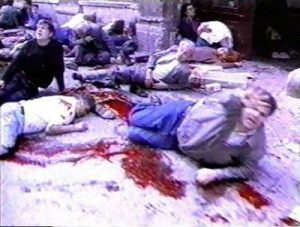Two massacres, and the tale of one loyal (Serb) Bosnian veteran
One of the most popular centers of commerce in my beloved Sarajevo is the Markale Marketplace, one of the thriving farmer’s markets of the former Yugoslavia. Just off of a narrow branch of Marshall Tito Boulevard, the Markale is a rich repository of fresh fruit and vegetables: produce of all shapes and hues, fresh as the neighboring farms and served with just the right helping of snappy but welcoming attitude. Mounds of mouth-watering blueberries and raspberries, prickly cucumbers, bright orange tomatoes, and bulbous cabbages of every size and shape abound. Come hungry and leave satiated, your bags filled to the brim.
Amidst this potpourri of produce stand the neat rows of rich, precious, locally produced jars of honey, the kind guaranteed to “stiffen your asparagus, good ‘an hard” – or so came the promise, in crude Bosnian, from one fun-loving and brazen vendor. Call it a natural aphrodisiac, an alternative to Viagra, Sarajevo-style. Accompanied by a suggestive pantomime of broadly salacious gestures, it struck me as highly amusing if slightly embarrassing, though it proved a welcome and mirth-filled diversion to the nearby vendors and patrons on an otherwise mundane day. Causing overly serious American tourists to blush is just another unanticipated attraction of the Markale.
But once upon a time, not so many years ago, the popular Markale became identified with pandemonium and tragedy. First in February, 1994, and then in an even more devastating ‘grenade’ (artillery) attack in August, 1995, Bosnian Serb forces deliberately took aim at Markale and its siege-ravaged devotees, spewing human carnage in its wake. Burnt remnants of human bones and flesh could be found scattered for hundreds of meters around the targeted area; over 100 Sarajevans were killed in the two attacks, many scores more wounded.
Hardened news reporters, rushing to the screams and horrifying bedlam, broke into tears. Taxis once again served as impromptu ambulances, and even some of the wounded pitched in to assist. To add insult to injury, the ‘Chetnik’ (radical Serb) forces cynically and stubbornly claimed that the ‘Muslims’ (Bosnian loyalists) had set off the explosions themselves. Untold hours were wasted studying imaginary trajectory paths and competing claims. It was if my beloved Sarajevo had been attacked by the devil himself.
Massacre at Markale Marketplace, Sarajevo, c 1994
(Srebrenica Genocide Blog)
The late Peter Jennings, then ABC news anchor who was in Sarajevo at that moment covering the siege, came upon the the carnage and was deeply disturbed. In 1994 and later in 1995, Jennings hosted two televised news specials focusing on Sarajevo’s ongoing tragedy, condemning the genocidal Serbian ‘ethnic cleansing’ in Bosnia, and the apathy if not indirect collaboration of the outside world.
By the time of my visit in 2007, most of Sarajevo’s scars had been plastered and painted over, and an elegant, permanent plaque, memorializing the massacre victims, stood framing the northern end of the market. When I inquired about it, I was quickly directed to the English-speaking Zoran, the smiling florist of Markale. But despite Zoran’s charm, his handsome, salt-and-pepper exterior belied a complicated personal history, which zigzags through Yugoslavia’s complex and tortured past.
Following the footsteps of his heroic World War 2 partisan grandfather, Zoran, a Serb, remained loyal to his anti-fascist roots. For Zoran, who is married to an ethnic Muslim woman, there was never any question of switching to the ‘Chetnik’ side, though numerous Bosnian Serbs, including some of Zoran’s own brothers, did just that.
In remaining loyal to his home and principles, Zoran paid a tough price – a bullet from Radovan Karadzic’s forces lodged in one of his lungs while he was fighting for Sarajevo’s very life. Like the city itself, Zoran survived, scarred, less trusting perhaps, less naive, but filled with an indomitable and almost irrational lust for life, that even the deeply faulted Dayton Accords and a paltry veteran’s pension could not crush.
Fascinated as I was by Zoran’s vivid accounts of the war, it was another, unexpected aspect of his past that made me laugh out loud. Zoran shares my passion for classic rock and roll. It turns out that back in the 1980s, he worked as a DJ at a trendy, outdoor Sarajevan dance club.
As he reminisced, the glorious kings and queens of my own past rock forays gradually came back to life: the Rolling Stones’ swaggering Mick Jagger, Proud Mary’s rompen-an-stompen Tina Turner, David Bowie’s gender-defying Ziggy Stardust (Screwed up eyes and screwed down hairdo, like some cat from Japan) – even the Sex Pistols, those Britt bad boys of the 1980s, with their arrogant vow to foist raging anarchy onto Thatcher’s increasingly conservative UK.
But it was another R & R icon that brought bittersweet tears to my rock nostalgia. Zoran was enamored of one of the cherished groups of my early college days: Jethro Tull. With their symphonic, over-the-top, opera-like lyrics, JT became a rock icon of the 70s and beyond.
Over and over would I replay those Tull albums in my cramped dorm room at University of Michigan’s ultra-bohemian Residential College, until one touchy neighbor threatened to “smash that f—ing record player,” a valued present for my 18th birthday, if he heard that song just one more time… Needless to say, I never did acquiesce.
How ironic, I mused, to have traveled halfway around the world in some weird, obsessive quest for abstract notions like Truth and Justice, only to discover a Serbian rock and roll soulmate at the end of such a topsy-turvy treasure hunt.
When all is said and done, Zoran deserves the deepest respect, as an injured war hero who arguably made a difficult and unpopular choice, based on his proud heritage and highest values, and who paid with a lung, a high price indeed.
For that, and for the dedicated and creative work with his precious flowers, for which he often devotes 12 hours per day, I salute him. But ultimately it is to Zoran’s rock and roll spirit that I wish to pay homage. Despite the endless brutality of the Bosnian “Civil War” and deeply personal losses, he has never forsaken his intrinsic musical soul:
Aqualung my friend/ Don’t you start away uneasy/ You poor old sod, you see, it’s only me/ Do you still remember December’s foggy freeze/ When the ice that clings on to your beard is screaming agony/ And you snatch your rattling last breaths/ With deep sea-diver sounds/ And the flowers bloom like madness in the spring…
by Robert Leonard Rope


